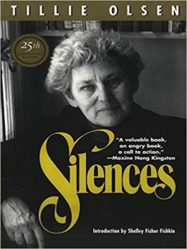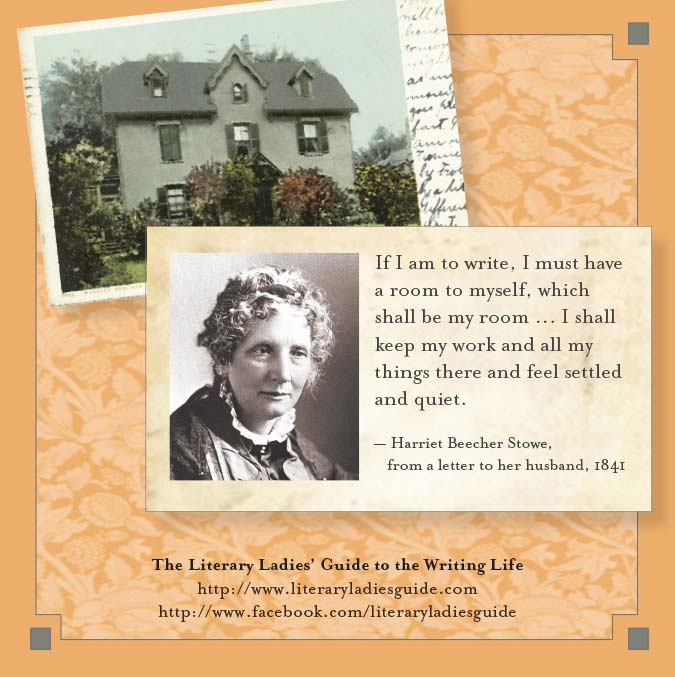Silences by Tillie Olsen: On Being a Writer and a Mother
By Nava Atlas | On September 7, 2017 | Updated December 6, 2022 | Comments (0)

In Silences (1978), Tillie Olsen examined letters and journals of women authors of the past to comment on how personal circumstances affected their creative lives.
Best remembered for this book as well as the classic short story Tell Me a Riddle, Olsen reflected on other writers’ experiences as well as the impact of motherhood on her own of writing. She looked at how marriage and parenting impacted literary output and opportunities for success. Issues of gender and class are central to these meditations.
Fast forward to the present, when many more women writers are successfully combining being a writer and being a mother. It’s still not easy, and women are the ones who have to think about it and make such choices.
“Just one kid” controversy and a backlash
In 2013, author Lauren Sandberg published an essay in The Atlantic claiming that women who wanted a successful writing career and also to be a mother should have “just one kid.” That was after learning that many of the women writers she admires had an only child.
Not surprisingly, there was a huge backlash, led by Zadie Smith. “I have two children,” she responded to Sandberg. “Dickens had ten — I think Tolstoy did, too. Did anyone for one moment worry that those men were becoming too father-ish to be writer-esque?” She went on to name other contemporary women authors who have two, three, or four children.
Many classic women authors remained childless
The truth is, of course, that many classic women authors of bygone days had no children. The choice was more black-and-white in times past, for various reasons.
Harriet Beecher Stowe had seven children, yet she was compelled to write for money to support the family (see Harriet Beecher Stowe, Motherhood, and Writing), as her minister husband was a poor earner. She endured many frustrations and heartbreaking losses along the way.
Other women authors of the past decided against marriage and family because they weren’t interested in men, though usually, they had to be circumspect about their sexuality. Still others simply made that black-and-white choice: family life, or a creative life.
Olsen wrote the essays collected in Silences beginning in the mid-1960s, when second wave feminism was brewing. A child of the depression who had to drop out of high school, then later supported four children of her own, she felt thwarted and frustrated during the twenty years of her own silences.
. . . . . . . . . .

Classic Women Author on Motherhood and Writing
. . . . . . . . . .
“One Out of Twelve: Women Who are Writers in Our Century”
Here’s a portion of the chapter titled “One Out of Twelve: Women Who are Writers in Our Century” (1971), a piece that became a fixture in the field of feminist criticism. Even as Olsen was writing this, she saw signs of change. But she also recognized ongoing obstacles:
More and more women writers … are assuming as their right fullness of work and family life. Their emergence is evidence of changing circumstances making it possible for them what (with rarest exception) was not possible in the generations of women before.
I hope and I fear for what will result. I hope (and believe) the complex new richness will come into literature; I fear because almost certainly their work will be impeded, lessened, partial.
For the fundamental situation remains unchanged. I’m like men writers who marry, most will not have the societal equivalent of a wife — nor (in a society hostile to growing life) anyone but themselves to mother their children.
Even those who can afford help, good schools, summer camps, may suffer what 70 years ago W.E.B. Du Bois called “The Damnation of Women”: that the only at the sacrifice of the chance to do their best work can women bear in rear children.” And: “Substantial creative achievement demand time … and with rare exceptions only full time workers have created it.”
I am quoting myself from “Silences,” a talk nine years ago. In motherhood, as it is structured:
Circumstances for sustained creations are almost impossible. Not because the capacities to create no longer exist, or the need (though for a while as in any fullness of life the need may be obscured), but the need cannot be first.
You can have a best only part self, part time. Motherhood means instantly interruptible, responsive, responsible. Children need one now (and remember, in our society, the family must often try to be the center for love and health outside world is not).
The very fact that these are needs of love, not duty, that one feels them as one’s self; that there is no one else to be responsible for these needs, gives them primacy. It is distraction, not meditation, that becomes habitual; interruption, not continuity; spasmodic, not constant, toil.
Work interrupted, deferred, postponed, makes blockage — at best, lesser accomplishment. Unused capacities at trophy, cease to be.”
… the habits of a lifetime when everything else had to come before writing I’m not easily broken, even when circumstances now often make it possible for writing to be first; habits of years — response to others, distractibility, responsibility for daily matters — mark you, become you.
The cost of discontinuity is such a weight of things unsaid, an accumulation of material so great, that everything starts up something else in me; what you take weeks, takes me sometimes months to write; what should take months, takes years.
I speak for myself to bring here the sense of those others to whom this is in the process of happening … and to remind us of those (I so nearly was one) who never come to writing at all.”
(excerpted from Silences by Tillie Olsen, 1978)
. . . . . . . . . . .

Learn more about Tillie Olsen
. . . . . . . . . .
How has being a mother and a writer changed?
How has being a mother and a writer changed since Tillie Olsen wrote this and the related essays in Silences between 1965 and 1978? Certainly circumstances have improved.
Family or creative life are no longer all-or-nothing choices for women who write. Being a writer and a mother are not mutually exclusive. But what can still be improved upon? A great deal, as it turns out. And this is a question that continues to be worth pondering.
. . . . . . . . . .

Leave a Reply